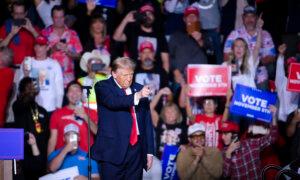The 2024 presidential race has been spellbinding. Here’s a recap of many of its most significant events.
News Analysis
The 2024 road to the White House has been riddled with more potholes, landmines, and detours than anyone could have imagined.
Amid a string of historic events, a few stand out as the most pivotal. The Republican nominee, former President Donald Trump, faced multiple criminal and civil court cases, and survived two assassination attempts. His opponent for the majority of the two-year campaign, President Joe Biden, exited the race after a difficult debate; then the Democratic Party chose Vice President Kamala Harris as a last-minute replacement to oppose Trump.
“By all accounts, everyone regards this as the most unique election of their lifetime,” said Susan MacManus, a retired political science professor who has studied U.S. elections for more than 50 years.
Any one of those events “would have turned the election on its heels” during past election cycles, MacManus said.
“It really hasn’t,” she said, “and it shows the competitiveness and the polarization of the country.”
The word “unprecedented” accurately describes many occurrences this campaign season. But that term doesn’t rightfully apply to the overall political climate of the season, Jeff Bloodworth, a professor of American political history at Gannon University, told The Epoch Times.
“The late 19th history was like this,” he said. “The early Republic also featured rough-and-tumble elections.”
From an historical perspective, “the post-1945 era is a placid outlier in American political life,” Bloodworth said.
“We aren’t used to this sort of politics, because the era we are exiting was defined by consensus.”
With such a low approval rating for the U.S.’s current trajectory in governance, people will vote for “which of these two candidates they feel is the best to change that direction,” MacManus said.
As voters look back at the 2024 election season, they are “disgusted with the way the campaigns have gone,” she said, because of the vitriol that both sides have lobbed at each other.
Even so, MacManus said, many Americans have held on tight during this bumpy ride because “they’ve been fascinated by this election and all the twists and turns.”
Here are a few of those.
FBI Raid, Then Indictments
A historic event that influenced the 2024 presidential campaign came even before Trump announced his third run for the presidency.
Agents seized documents, some with classified markings—a search that later led to federal charges against Trump and some of his allies.
Trump says the years-old accusations were filed as “lawfare” to derail his reelection bid. He has denied any wrongdoing. Prosecutors have said they were following the law.
First Trial, First Conviction
This past spring, the former president stood trial in the New York business records case.
The accusations centered on money paid to an adult film actress, Stephanie Clifford, also known as Stormy Daniels. She said he had an affair with her—a claim that could have hurt his chances of winning the 2016 presidential election. Trump’s lawyer paid her to keep that allegation quiet; Trump won the election. Prosecutors allege that business records were illegally altered to hide the true purpose of the payments.
The resulting guilty verdicts on 34 charges left some of the nation’s foremost legal scholars mystified over the hard-to-define crime that jurors believe he committed.
Trump’s campaign labeled him a “political prisoner,” calling on Americans to oppose his conviction by a “rigged” system and to help him prevent others from being targeted for their political views.
History Made in Iowa
While Biden faced no serious challengers in the primary election, Trump initially confronted a crowded field of Republican presidential hopefuls.
His two most formidable challengers were Florida Gov. Ron DeSantis and Nikki Haley, a former North Carolina governor who had also served as the United Nations ambassador during Trump’s administration.
The former president’s victory broke two records. By finishing nearly 30 percentage points ahead of his nearest competitor, DeSantis, he beat the prior record Republican margin of victory. That record, set in 1988, was 12.8 percent.
Trump also became the first Republican candidate to win more than 50 percent of the votes in an Iowa Caucus with more than two candidates.
First Son Charged, Convicted
In late 2023, Biden’s son, Hunter Biden, was indicted on gun charges and tax-evasion charges in two separate federal cases.
Biden Avoids Documents Prosecution
Special counsel Robert Hur announced on Feb. 8 that Biden would not face criminal charges for his handling of classified documents.
Hur made the decision even though he found Biden had “willfully retained” the materials after he exited the White House as vice president under President Barack Obama in 2017, when Trump took office.
Because Biden comes across as “a sympathetic, well-meaning, elderly man with a poor memory,” a jury would be unlikely to convict him, Hur wrote.
Pivotal Biden–Trump Debate
On June 27, Trump and Biden faced off for a debate that CNN hosted in Atlanta. It ended up being their first and only debate of the 2024 campaign—and it was arguably one of the most consequential political debates in U.S. history.
In an instant poll after the debate, 67 percent of CNN viewers said they thought Trump had won.
Some members from Biden’s own party began calling for him to withdraw from the race, based partly on his debate performance, which included frequently clearing his throat and taking long pauses between some of his sentences.
Shots Ring Out
As Trump was riding high in the wake of the debate, with polls showing him pulling further ahead of Biden, shots rang out just as he began a campaign rally in Butler Township, Pennsylvania, on July 13.
At least 15,000 people were in attendance at the Butler Farm Show grounds when the gunfire erupted, wounding the former president and two rallygoers. A third attendee, retired firefighter Corey Comperatore, 50, was slain as he shielded his wife and daughter from the bullets.
A Secret Service countersniper returned fire, killing the gunman who fired from an unguarded rooftop. Amid the gunfire, agents clustered around Trump, forming a human shield. He had crouched down after a bullet grazed his right ear. As he climbed back onto his feet, Trump raised a fist, with blood streaking down his face, and said, “Fight, fight, fight.” A photographer captured the moment in an image that instantly became iconic, with a blue sky and the American flag serving as the backdrop.
Biden issued a statement and made a brief address to the nation, denouncing the violence.
Trump Appears With Bandaged Ear
Days after surviving the assassination attempt, the former president headed to Milwaukee for the 2024 Republican National Convention. He made an appearance the first night of the convention, wearing a white bandage over his gunshot wound; attendees later donned similar “bandages” on their right ears in a show of solidarity with Trump.
The newly minted Trump–Vance ticket held their first joint rally in Grand Rapids, Michigan, on July 20 under heavy police presence.
Switching Hitters
On July 21, Biden announced he was discontinuing his campaign. After a brief period of speculation over whether he would endorse his second-in-command, Biden issued a separate statement saying he was endorsing Harris as his preferred successor.
Some raised concerns over the process, considering that no other candidates had been given a chance to ascend to that position, and Harris had not been on Democratic voters’ primary election ballots.
Debate Over Abortion, Immigration, Pets
When ABC News hosted a debate between Harris and Trump in Philadelphia on Sept. 10, both candidates avoided giving new specifics on policies, but repeated their past positions on the economy, abortion, and immigration.
“Remember this—she is Biden,” Trump said, tying Harris to Biden’s policies, which he said caused inflation and high prices. Harris countered: “Clearly, I am not Joe Biden.”
For weeks afterward, people were talking about Trump’s allegation that he had been told that immigrants in Springfield, Ohio, were eating residents’ domesticated animals, spawning a plethora of internet memes about “eating the cats.”
Second Would-Be Assassin
On Sept. 15, authorities arrested Ryan Wesley Routh on accusations that he was intending to shoot Trump at the former president’s golf course in Florida.
A Secret Service agent spotted a gun barrel protruding from a bushy area along a perimeter fence line. The agent fired, causing the suspect, later identified as Routh, to flee before he had been able to take aim at the former president. Agents scurried to protect Trump, who remained unharmed in the incident.
Headline-Grabbing Appearances
Harris and Trump both paid visits to the Arizona–Mexico border. In September, Harris stated she would pursue stricter border policies if she is elected; in August, Trump said he already did so during his presidency, but the Biden–Harris administration reversed his policies.
He urged people to “Dream Big Again,” a spinoff of his “Make America Great Again” slogan.
Savannah Hulsey Pointer, The Associated Press, and Epoch Times staff contributed to this report.
Original News Source Link – Epoch Times
Running For Office? Conservative Campaign Consulting – Election Day Strategies!


